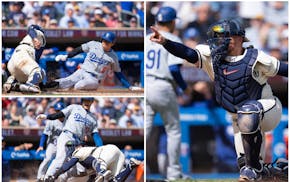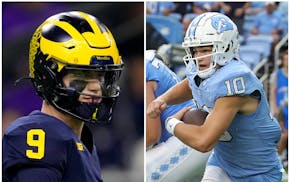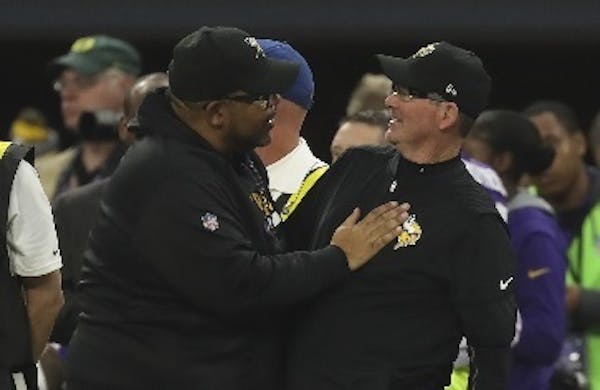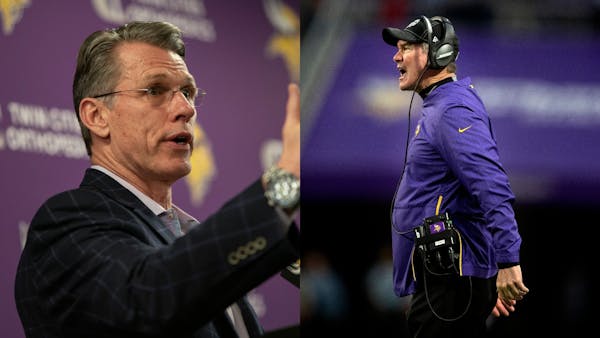Rick Spielman refers to himself as the "COVID police."
Presumably, the Vikings general manager isn't patrolling the team's palatial headquarters with a badge looking for non-mask wearers or employees ignoring social distancing protocols as training camp commences in earnest this week. But Sheriff Spielman is preaching vigilance. He expects others to act similarly.
"It's on everybody in this organization," Spielman said Monday, "whether you're a player or coach or anyone on the staff to not only be responsible inside this building but also be responsible outside this building."
This is how the NFL intends/hopes/prays to make pandemic football succeed, in the absence of a bubble. The honor system. Self-policing.
Is this plan realistic?
Time will tell whether the league's model will work or ultimately prove that allowing thousands of employees the freedom to live outside a bubble during a season leaves organizations too vulnerable in trying to contain a virus that is not loosening its grip.
Early returns from non-bubble brethren Major League Baseball are not exactly encouraging in predicting how football will manage this endeavor. Especially since football rosters are double the size of baseball rosters, and blocking, tackling and fumble scrums represent the antithesis of social distancing.
"I think everybody is cautiously optimistic," Vikings coach Mike Zimmer said.
I want to be optimistic too. I'd love to have the NFL be able to start and finish this season. Wanting football to be played does not reflect a callous attitude toward the health risks of COVID-19 and uncertainty about its long-term effects. Any player has the absolute right to opt out and should be supported 100% without judgment.
My pessimism about whether this can work is hard to shake, though. The outbreaks that hit Major League Baseball in the first week of its season bring a sobering reminder that conducting sports outside of a controlled bubble is fraught with challenges.
The NHL announced Monday that the league had zero positive tests out of 7,013 tests administered inside the league's two Canadian bubbles (Edmonton and Toronto) from July 27 to Aug. 1. That's 24 teams, every member of the traveling party tested daily.
The NBA, WNBA and MLS report good news inside their bubbles in Florida, too.
Bubbles are proving to be effective.
Creating a bubble, or multiple bubbles, for football was unrealistic logistically, given the sheer number of people involved in day-to-day operations with every team, resources required and asking players and staff to isolate in the bubble for five months.
The NFL instead hopes to pull this off by instituting wide-ranging health and safety protocols inside facilities and then trust that everyone will avoid high-risk behavior once they go home each day.
For instance, nightclubbing is a no-no. That one is obvious. But players and team employees have friends and family members who potentially can expose them to the virus, even if they take precautions in their daily routine. We're talking roughly 2,000 players alone.
"What happens if any of us go home and one of our kids brings it home into the house?" Spielman said. "You just have to prepare as best as you can. Do everything that you possibly can to make it as safe as you can. But you can't control everything that comes outside. You may have done everything right and somebody does something wrong and it could wipe out the whole thing."
NBC's Peter King reported that the New Orleans Saints created a de facto bubble by renting four floors of a hotel to sequester players, coaches and staff during training camp. Staying there is voluntary since the league and players union didn't agree to a bubble, but the Saints anticipate 150 of the 180 employees designated as Tier 1 (players included) will quarantine at the hotel.
The Vikings hope safe practices inside their facility and constant reminders about what to do when they leave will keep the virus under control.
"Like we told our players, this is a new world for us too," Zimmer said. "So we're going to do our very best to keep them safe and then move forward."
There is no doubt the Vikings have made the safety of all their employees their No. 1 priority. They are not protected by a bubble, though, and that makes it feel as if the NFL is stepping out on a tightrope.
chip.scoggins@startribune.com
Scoggins: Why 'championship or bust' fits these Wolves

Scoggins: Anatomy of a game-saving play as Correa throws out Ohtani

Scoggins: McCarthy or Maye? Ex-U coach breaks down Vikings' options
Scoggins: Cory Provus getting ready for 'biggest challenge' of career



